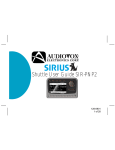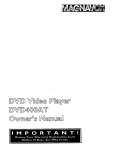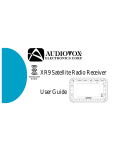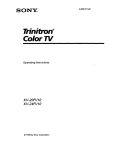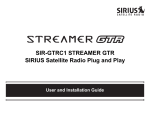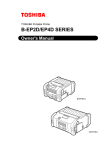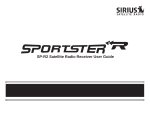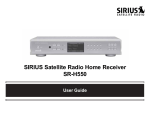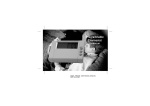Download Audiovox SIRPNP3 Satellite Radio User Manual
Transcript
Shuttle User Guide SIR-PNP3 s.seek 001 p.tune C hannel N am e A rtist S ong C ategory 12:00P A -1 JUMP 128-7193A 1 of 32 Released: 8-6-04 Revision A: 8-10-04 Removed maximum FM frequency reference; default display mode PDT to 2 lines and font type to A. Congratulations You are one step closer to experiencing the latest innovation in Sirius Satellite Radio. Sirius will revolutionize your in-home or vehicle entertainment with: • Over 120 channels of original programming, including – 65 channels of 100% commercial-free music – guaranteed, Over 50 channels of world-class sports, news, talk and information. Your Audiovox Shuttle receiver must be used with an adapter kit, such as the Audiovox Home kit, Boom Box or Vehicle Kit as required by your specific installation needs. These kits are available at retailers where Audiovox main units are sold. Audiovox Home Kit: Audiovox Vehicle Kit: Audiovox Boom Box: Part Number SIR-HK3 Part Number SIR-CK3 Part Number SIR-BB3 -2- 128-7193A 2 of 32 Contents Edit Code .......................................................... 21 Audio Level Options ......................................... 21 Antenna Aiming (Home Installation) ................ 21 Memory Options ............................................... 22 Time Based Features ...................................... 22 Clock ................................................................. 22 Format ........................................................... 22 Time Zone ..................................................... 23 Alarm Clock .................................................. 23 Alarm Time ................................................... 24 Program Alert ................................................... 24 Time/Day ....................................................... 24 Channel ........................................................ 25 Program Alert On/Off ..................................... 25 Auto Shutdown ................................................. 25 Sleep Mode ...................................................... 25 Factory Default ..................................................... 26 Remote Control Unit ............................................ 26 Troubleshooting .................................................. 28 Specifications ...................................................... 28 APPENDIX A ......................................................... 29 Warranty ............................................................... 31 Cautions and Warnings ...................................... 4 Shuttle System Components .............................. 4 Introduction .......................................................... 5 Enjoying Your Sirius Shuttle ................................ 5 Sirius Shuttle Controls ......................................... 6 Basic Operation ................................................... 8 Tuning by Category .......................................... 8 Content Listing Options (Look Ahead) ............ 8 Direct Tuning ...................................................... 9 Setting/Using Channel Preset Buttons ............. 9 Preset List Mode .............................................. 10 Display Button .................................................. 10 Memory Button (S-Seek Function) ................... 11 Menu Display Options ......................................... 14 Sirius ID ............................................................ 14 Jump Settings .................................................. 14 Display Settings ............................................... 18 FM Transmitter Options ................................... 19 Add or Skip ....................................................... 20 Lock Options .................................................... 20 Lock/Unlock Default Code Function ................ 20 -3- 128-7193A 3 of 32 Cautions and Warnings 1. Do not install the Shuttle in a position that hinders your view through the windshield, or obstructs viewing of the dashboard indicators and displays. 2. Do not install the unit where it may obstruct the operation or deployment of safety devices, such as airbags, etc. 3. Do not allow operation of the unit to detract from safe driving practices; remember that you are responsible as the vehicle operator to adhere to all safe driving and traffic regulations. 4. This device complies with Part 15 of the FCC Rules. Operation is subject to the condition that this device does not cause harmful interference. 5. By adhering to these warnings and safety considerations, serious accidents and/or personal injury can be avoided. Shuttle System Components Shuttle Unit Model PNP3, P/N144-2453 s.seek 001 p.tune C hannel N am e A rtist S ong C ategory 12:00P A -1 JUMP Remote Control Unit P/N136-3803 Introduction The Audiovox SIRIUS® Shuttle processes the satellite signals received by the externally mounted antenna (purchased separately as part of the Home, Vehicle or Boom Box Kits). The Shuttle recognizes and decodes the incoming SIRIUS® program information and provides an audio signal to your radio or other audio output equipment. Batteries for Remote, (2) “AAA”, P/N156-2215 -4- 128-7193A 4 of 32 NOTE: The SIRIUS® signal can be received and processed virtually anywhere as long as there are no obvious satellite signal obstructions such as nearby buildings, high terrain, parking garages or tunnels. The Shuttle is typically installed in an accessible location of the vehicle (dash area), consistent with line-of-sight operation of the remote control, and/or within easy reach of the driver. For home use, situate the Shuttle close to your stereo receiving equipment. Enjoying Your SIRIUS® Shuttle You can begin to enjoy Sirius® Satellite Radio as soon as the Shuttle and Kit installation are complete: 1. Set up your Audiovox Shuttle using the installation instructions included in your Home Kit, Vehicle Kit or Boom Box Kit, or with the help of a profes sional installer. NOTE: Refer to Antenna Aiming (page 21) during the installation procedure. 2. When power is available to the unit, note that the integral Power button LED icon lights red. Then press the Power button to turn on the Shuttle. 3. The Sirius logo ( ) appears on the display followed by the Sirius preview channel. If this is the first time using the Shuttle, the screen will display “Updating Channels”. If not, go to channel 184 using the direct channel method, page 9, Direct Tuning. 4. To obtain the Sirius identification (ID) number, press the MENU button. The Menu Options page appears with the Sirius ID option highlighted. Press the Encoder knob and the 12 digit Sirius ID number will appear. Write the number here for future reference. 5. Activate your Sirius® radio service ---- it’s easy. You have one of two choices to activate your service: (a) Visit the website at sirius.com and click on the “JOIN” section. You will then need to follow some simple directions and provide Sirius with some basic information in order to activate your service. -5- 128-7193A 5 of 32 (b) Call Sirius at 1-888-539-SIRIUS (7474). One of our friendly Customer Care representatives will takethe necessary information and walk you through the activation process. MEMORY (s-seek) BUTTON BAND (p.tune) BUTTON POWER BUTTON Sirius® Shuttle Controls The Audiovox Sirius® Shuttle Unit provides eight control buttons, an Encoder knob and 10 number keys. Power Button: This button applies power to and removes power from the Sirius® Shuttle as follows: 1. A momentary press of the power button turns on the receiver, and is accompanied by a confirmation beep tone. The Sirius logo/name ( ) initially appears on the LCD display for 3 seconds, followed by the Default screen (if turned on for the first time), or by the tuning mode in effect when the unit was last powered off. 2. A momentary press of the power buttonturns off the receiver. While the unit powers down, the Audiovox logo appears for 2 seconds and the unit turns off. s.seek 001 LCD DISPLAY MENU BUTTON DISPLAY BUTTON ENCODER KNOB AND PUSH-TO-SELECT (ENTER) BUTTON p.tune CATEGORY SEARCH (UP/DOWN) BUTTONS C hannel N am e A rtist S ong C ategory 12:00P A -1 JUMP BUTTON INFRARED SENSOR JUMP PRESET (NUMBER) BUTTONS 3-DIGIT CHANNEL NUMBER AUTO SIZING/ SCROLLING SONG TITLE 8-CHARACTER CATEGORY NAME SIGNAL STRENGTH INDICATOR CHANNEL NAME Default Screen 001 C hannel N am e A rtist S ong AUTO SIZING/ SCROLLING ARTIST NAME CLOCK C ategory 12:00P A -1 BAND/PRESET BANK NUMBER -6- 128-7193A 6 of 32 Encoder Knob and Select Button: The Encoder knob is the primary control for navigating through the various lists and option menus available on the unit. In the default mode, the Encoder knob provides sequential tuning through the available program channels. Clockwise (CW) rotation tunes up one channelper-detent, while Counterclockwise (CCW) rotation tunes down one channel-per-detent. When in the list or menu mode, turning the Encoder knob CCW and CW scrolls down and up, respectively, through the various menus and lists. The current selection from the list will be highlighted on the display. When the item is highlighted, press the Encoder knob (Select Button) to enter the selection. Pressing and holding the Encoder knob will tune to the previously selected channel. Category Buttons: The Up or Down category buttons allows the user to advance through the channel groups based on content category. By turning the rotary Encoder knob, the user can then scroll up or down through the channels within that category. Once a choice has been made, it can be entered by pressing the Select Button. Memory (MEMO) Button (s-seek) Function): This feature allows the user to capture and store the current program data information (Channel Name & Number/Artist & Song title). You can store up to 24 Artist/Song Title combinations. The Shuttle also has the capability to search the current incoming Sirius signal, and thereby alert you if it matches the Artist/Song title stored in Shuttle memory. Display (DISP) Button: This button allows the user to choose one of several ways of presenting the Channel Name, Artist and Song title information on the LCD screen. Menu (MENU) Button: The MENU Button is used to access “Menu Options” which displays the user setup menu, plus other feature/function adjustments. BAND Button (BAND)/Preset Tune (p.tune): Each momentary press of the BAND Button allows the user to switch between 3 bands of Channel presets (10 presets each A, B and C). Pressing and holding the BAND Button for 2 seconds initiates preset tuning (accompanied by a beep confirmation tone) that will display and tune all stored preset channels in sequence. This is indicated by the reverse image of the channel number -7- 128-7193A 7 of 32 and band preset number on the display. Pre- set tuning continues until the user decides to terminate this function by pressing and holding the BAND Button for 2 seconds. Keypad Buttons 0-9: These buttons are used to directly enter a desired channel number. They are also used when entering and recalling preset channel numbers into memory. Jump ( ) Button: As an example, the button stores a favorite memory preset to allow you to easily tune to a selected city of interest (or any other channel), and then tune back to the music/talk/sports programming you were previously listening to. Basic Operation With the unit properly installed, activated and connected to your home or vehicle audio system, proceed as follows: 1. Press the Power button; the Shuttle turns on and the Sirius logo appears for 3 seconds followed by the default display for the channel and tuning mode in effect prior to turnoff. 2. Rotate the Encoder knob to select and play the desired channel, or use the Category Up/Down buttons to tune and select a desired channel based on genre. Tuning By Category When in Category Tuning Mode, each momentary press of the Category Up/Down Button(s) advances through the available Genres: Category List Display 001 002 003 004 C ategory C hannel N am C hannel N am C hannel N am C hannel N am e e e e 1. Using the Encoder knob, select the desired channel. 2. Press the Encoder knob to select that channel. 3. Once the channel has been selected, the unit will revert to the default screen and your selection will be played. Content Listing Options (Look Ahead) This feature allows you to view what is playing on other channels without having to change the current channel you are listening to. The content listing options are selected by using the DISP button. When the default screen -8- 128-7193A 8 of 32 is displayed on the LCD, pressing and holding the DISP Button will display all the available channel numbers and channel names. The second press of the DISP button will display all currently available artists. The third press of the DISP button will display song titles. While in the Category List menu, pressing the DISP button changes Channel List to Artist List. The available content listing now displays information by the Artist Name. Category Song Category Artist Title Display Name Display 001 002 003 004 C ategory A rtist N am e A rtist N am e A rtist N am e A rtist N am e 001 002 003 004 Direct Tuning Channels can also be directly accessed by pressing the Encoder knob and using the 0-9 number keys to numerically enter the desired channel. Once the desired channel number has been entered, press the Encoder knob again to play. C ategory S ong T itle S ong T itle S ong T itle S ong T itle The DISP button is also used during category tuning. Consecutively pressing the DISP button while tuning by category will display the Channel Name, Artist Name or Song Title within the selected category. While the preceding screens are displayed, rotating the Encoder knob allows navigation through the list. When the desired selection is highlighted, press the Encoder knob and your selection will be played. Setting/Using Channel Preset Buttons The unit contains 10 preset buttons. There are three banks of preset memory locations offering a total of 30 presets. These banks are designated A, B and C and can be selected using the BAND button. The display in the lower right hand side changes to show the corresponding Preset bank. Each bank will store 10 user-preferred channels. Select the desired channel you wish to save into memory by using the Encoder knob, the direct tuning method or the category tuning method. With the desired channel playing, press and hold any of the numbered keypad buttons (0-9); the corresponding preset number will flash. A confirmation tone is heard, confirming that the preset has been stored. Continue this procedure for storing all desired streams. To retrieve a preset channel, momentarily press and release the number button corresponding to the desired channel. -9- 128-7193A 9 of 32 001 A -1 A -2 A -3 A -4 A -5 C hann el N am e A rtist P reset T une M o de S ong C atego ry 12:00P A - 1 001 C hannel N am e A rtist S ong C ategory 12:00P A -1 Press and Hold Preset Button Press and Hold Preset Button 001 C hannel N am e A rtist S ong C ategory 12:00P A -1 Preset List Mode To search by list for a preset, press and hold the BAND button to enter Preset Tune mode. When in the Preset Tune Mode, press and hold the DISP button for 2 seconds; this exits normal preset tuning and enters a 6-line menu mode which displays the Preset number (A-1), a single space and the 20-character channel name. While in the Preset List menu, pressing the DISP button once will change to Artist List; a second press of the DISP button changes to Song List. While the contents of the preset listing are displayed, rotate the Encoder knob to navigate through the list. When the desired selection is highlighted, press the Select Button and the channel will be played. A -1 A -2 A -3 A -4 A -5 A rtist A rtist A rtist A rtist A rtist N am N am N am N am N am e e e e e C hann el N am C hann el N am C hann el N am C hann el N am C hann el N am A -1 A -2 A -3 A -4 A -5 e e e e e S ong S ong S ong S ong S ong T itle T itle T itle T itle T itle Display Button Pressing the Display button from the Default display toggles between the artist name/song title screen or large letter format. When the letter size changes, the field will scroll. This feature is useful when viewing the display at a distance. 001 002 003 004 005 NOTE: C hannel N am C hannel N am C hannel N am C hannel N am C hannel N am e e e e e The field will scroll only if the length of the artist or title cannot be viewed in its entirety. Pressing and holding the Display button will enter the channel list mode. While in the Channel List mode, any subsequent press of -10- 128-7193A 10 of 32 the DISP button will display program information by Artist Name, Song Title or channel name. Pressing and holding the DISP button will exit the Channel List mode and return to the previously selected tuning/display mode. 001 002 003 004 005 A rtist N am A rtist N am A rtist N am A rtist N am A rtist N am e e e e e 001 002 003 004 005 S ong S ong S ong S ong S ong T itle T itle T itle T itle T itle Memory Button (S-Seek Function): This feature allows the user to capture and store the current program data information (Artist & Song title) with up to 24 listings (24 Artist/Song Title combinations). The unit also has the capability to search the current incoming Sirius signal and alert the user when a saved song is being played. 001 C hannel N am e 001 C hannel N am e A rti st X U sed / Y E m pty S ong A rtist S tored S ong C ategory 12:00P A -1 C ategory 12:00P A -1 2. By holding down the MEMO button for 3 seconds, the stored memory information (one at a time) is displayed on the LCD screen in page format. Use the Encoder knob to scroll through the 24-page listing and view the information. This function allows you to recall information regarding the Artist/Song Title for your own personal review. To return to the default tuning mode press and hold the MEMO button for 3 seconds. Memory S Artist Song Push SEL to configure 1. While the Shuttle is in either of the two standard display modes, momentarily pressing and releasing the MEMO button stores the current program data information within the Shuttle’s memory. A Memory Stored pop-up screen, followed by “X Used/ Y Empty” will each appear for 1 second. 3. Momentarily pressing the Encoder knob while in memory recall mode results in a pop-up screen displaying two selectable options: Delete S-Seek -11- 128-7193A 11 of 32 M em ory R ecall D elete S -S eek Delete S -S eek Yes No ON O FF Turning the Encoder knob highlights the options and pushing the knob selects the option. The delete option allows the user to delete the currently featured artist/ song title selection from S-Seek memory. The default setting is NO. If the YES option is chosen, the currently featured Artist/ Song Title is deleted from S-Seek memory. The SSeek option allows the user to turn the S-Seek function on or off. The default setting is S-Seek on. If the off option is chosen, the user will not be alerted when a stored artist song title selection is currently playing. Momentarily pressing the MEMO button will exit the current menu and return to the previous menu. 4. When the S-seek function is on each time the Shuttle is turned on, it automatically searches the incoming signal to determine if a match exists between the signal and the currently saved information stored in receiver memory. If one or more matches are found, pop-up screen momentarily appears for 2 seconds and displays the Phrase S-Seek Alert. An audible beep tone will be heard indicating that a match has been found. The display then reverts to the S-Seek Alert screen which displays the current matches. You can now select the Artist/Song that you wish to listen to. 001 C hannel N am e A rti st S -S eek A lert S ong C ategory 12:00P A -1 S -S eek A lerts A rtist N am e/ S ong A rtist N am e/ S ong A rtist N am e/ S ong A rtist N am e/ S ong -12- 128-7193A 12 of 32 No stored match alert is provided for the currently selected channel. To ensure that no duplicate entries are stored in memory, the receiver will check the stored input data to ensure the information about to be stored is not already in memory. a. If one or more matches are found, a display list appears, and allows you to scroll through the list of songs using the Encoder knob. Once a song is found, it can be selected by press ing the Encoder knob, and the display will revert to either of the selected display modes. b. If a selection is not chosen within 10 seconds after the last action, the screen will revert to the previously selected display and tuning mode. NOTE: Play of the current selection will continue until a new selection is made. 001 C hannel N am e 001 A rti st S -S eek Full S ong C ategory 12:00P A -1 C hannel N am e R eplace A rtist S ongC ancel C ategory 12:00P A -1 a. By selecting Replace, the memory list will appear, and you can use the Encoder knob to select the information that you would like to overwrite with the new Artist/Song Title. After highlighting the selected title in the list, press the Encoder knob to delete the stored Artist/ Song Title,and replace it with the updated information. b. By selecting Cancel, the prompt screen would disappear and revert to the original screen. 5. If the MEMO button is pressed to save a currentlyplaying selection, and all of the memory spaces are full, S-Seek Full will flash on the display for 1 second, followed by a pop-up screen presenting the Replace-Cancel options. This prompt allows you to make the following Replace/Cancel choices: -13- 128-7193A 13 of 32 Menu Display Operations To enter the Menu Options page, press the MENU Button. The Menu Options list will appear on the LCD display. Using the Encoder knob, highlight the option you wish to adjust and then press the Encoder knob. The following options are available: Sirius ID Jump Settings Display Settings FM Transmitter Options Add or Skip Lock Options Audio Level Options Antenna Aiming Memory Options Time Based Features Factory Default If, while in the menu screen function, a button is not pressed within 10 seconds from the previously selected function, the unit exits the menu screen function and reverts to the default screen display. Sirius ID Jump Settings Once the user presses the Encoder knob to enter the “Jump Settings” screen, a display appears for 2 seconds to provide directions for the user’s selection. This pop-up screen is followed by a display offering 2 options for the user: Traffic: XXX and JumpSet, where XXX is the 3-letter abbreviation of a city where traffic/weather reports are available. 2 sec. Menu Descriptions Sirius ID Displays your 12 digit Sirius ID number. No adjustments are allowed in this mode. To exit this option, press the Encoder knob or Menu Button. NOTE: The Jump button can be programmed to select either of the jump setting options, but not both. -14- 128-7193A 14 of 32 Traffic Option When the Traffic option is highlighted on the “Choose Jump Setting” screen, the 3-letter abbreviation of the currently selected city is also shown; however, if no city has been selected, NONE appears. To select a desired city, press the Encoder knob when the Traffic option is highlighted, and the “Choose Traffic Market” screen appears with a listing of abbreviated city names in alphabetical order. Rotating the encoder knob or pressing the CH+/CH- button on the remote scrolls through thecity list, highlighting each city for selection. When the desired city is highlighted, press the Encoder knob to confirm selection. The city ID is then saved for the Jump feature. If the action is canceled without making a selection (by pressing MENU to return to main menu), no city ID is saved. However, if a city is selected, itcannot be deselected (i.e; return to NONE status); however, the city can be replaced with another city. A city selection may not be available at a given time. In this case, a pop-up screen is displayed for 2 seconds indicating the city list is being up dated, and the display then returns to the previous menu option. NOTE: Current city abbreviations are presented in APPENDIX A of this manual onPage 29. Jumpset Option When the “JumpSet” option is highlighted on the “Choose Jump Setting” screen, and the Encoder knob is pressed to select this option, the Jump but ton can now be used as a JumpSet function. The -15- 128-7193A 15 of 32 Options. Then follow the previous steps describing city selection. display appears for 2 seconds, as shown previously, providing directions to set the JumpSet channel, before returning to the “Choose Jump Setting” screen. 2 sec. Once the Jump button is set to function as JumpSet, the Traffic line displays “NONE” to signify that the button can no longer be set to traffic alert. Initial Activation When the Jump Button is pressed for the very first time, a pop-up shall appear indicating “Set Jump Button” for 2 seconds, before taking the user to the following “Jump Setting” screen of Menu 2 sec. Tuning and Alert While listening to any Sirius programming, a press and release of the Jump button, or a press and hold of the Jump Button activates the Jump function. If this is the first time the Jump button is activated, refer to Initial Activation. Other wise, the receiver will recognize whether the Jump button has been set to city traffic report or simply as a JumpSet button. The tuning and alert mechanism only works in the normal operation mode, and not in Channel List Mode, Category List Mode, Preset Tuning Mode or Menu Option Mode. Traffic/City Market If the receiver determines that the Jump button is set to Traffic (City Market), it then detects whether a City ID has been set. If the City ID is not present (not set inadvertently), the adjacent screen appears indicating the Button was not set. -16- 128-7193A 16 of 32 If a city ID has been set, the receiver will immediately start scanning all channels for a matching City ID. While searching for the city ID, a pop-up appears for 2 seconds, with “XXX Pending”, where XXX is the 3-letter abbreviation of the city name, specifying that the receiver is indeed search ing and waiting for the desired traffic/weather report. The band indicator (preset bank) on the dis play changes to the Jump button icon to signify that the receiver is in searching mode. The receiver continues searching until a match is found or any list mode (Channel list, category list, Preset Tune Mode or Menu Option) is entered prior to a found match. When it exits any of the list modes and returns to the normal operation mode, the city ID search resumes until a match is found. If the selected city’s traffic/weather information is being broadcast on a different channel, then the receiver tunes to that channel immediately. If the city of choice is the current channel, the receiver tunes to the previous channel. The audio remains on the current channel until the receiver is tuned to the favorite channel. If no previous channel is available; e.g., first channel tuned to after a power cycle, an audible beep occurs and the receiver remains tuned to the current channel. 2 sec. Jumpset JumpSet is when the Jump button is chosen to act as an enhanced Preset button. Setting of the JumpSet is the same as any other Preset: While listening to any Sirius channels, a press and hold Jump Icon -17- 128-7193A 17 of 32 of the Jump button saves the current channel as the JumpSet channel. When a channel is saved as a JumpSet, the band indicator will change to to indicate that the current channel is associated with the Jump button. tuned to after a power cycle, there will be an audible beep and the receiver remains tuned to the current channel. Replace The traffic city ID can only be replaced by changing it in the Menu Option - Jump Setting - Choose Traffic Market. The JumpSet channel can be replaced by programming another channel as the JumpSet channel. Display Settings The following adjustments are possible: If the receiver determines that the Jump button Setting is a JumpSet, before a JumpSet channel is chosen, pressing and releasing the Jump button yields a pop-up screen indicating “Button Not Set”. If the channel is set, pressing and releasing the Jump button tunes the receiver to the JumpSet channel immediately. If that channel is the current channel, the receiver tunes to the previous channel. If no previous channel is available, e.g. first channel Contrast Control Dimming Control Font Type To enter any of these modes, use the Encoder knob to highlight the option you wish to adjust and press the Encoder knob. Upon entering either the contrast or dimming control, a 10 segment horizon tal bar graph is displayed with a “-” sign to the left and a “+” sign to the right. The current setting is indicated on the bar graph. Rotating the Encoder knob adjusts the bar graph indication and function accordingly. -18- 128-7193A 18 of 32 Dimming control offers two choices; Manual and Automatic. In both cases, a 10-segment horizontal bar graph is displayed with a “-” sign to the left, and a “+” sign to the right. The current setting is indicated on the bar graph by a reverse image segment. The Font Type allows the user to select the appearance of text on the Shuttle display. FM Transmitter Options The following adjustments are possible: FM On/ Off Frequency Selection FM On/Off: Upon entering this mode, rotating the Rotary Encoder knob to toggle between the FM ON or FM OFF function/display selection. To select and/or exit this function, press the Encoder knob. (No button activity for 10 seconds will also exit this function.) FM Transmitter Option ON/OFF ON/OFF Frequency Selection ON OFF NOTE: It is recommended that you turn the FM Transmitter off if you are using the low level audio outputs in your particular application. Frequency Setting: Upon entering this mode, any FM transmitter frequency can be chosen using the Category Up/Down buttons for coarse (1.0MHz steps) frequency selection, and the encoder knob for fine (200kHz steps) frequency selection. For example, to increment and decrement a frequency of 1.0MHz within the minimum (88.1MHz) and maximum FM frequency range, press the Category Up/Down button as necessary to enter the desired range (e.g., 89.1MHz to 90.1MHz); then use the encoder knob to choose the desired frequency within that range in 200kHz steps. Press the select button to enter the new frequency setting, or press the MENU button to return to the menu options page with no change to frequency. -19- 128-7193A 19 of 32 Add or Skip Upon entering this mode, a channel list is displayed with the current channel in play highlighted. Rotate the Encoder knob to navigate the list and highlight the channel to be adjusted. Once a channel has been highlighted, pressing the Select Button displays the text “Skip” next to the channel, and prevents the channel from being accessible during any of the tuning modes. Skipped streams can only be accessed either through direct channel number entry or by returning to this menu and going through the same process to return the skipped channel to the list. Upon adding a channel, the text “Skip” is removed from alongside the channel number/ name. Lock Options Upon entering this mode for the first time, the user is prompted to enter a four digit numerical code that is used to lock/unlock channel access. All future entries into this mode displays a channel list with the current channel in play highlighted. The Encoder knob is used to navigate the list and highlight the channel to be adjusted. Once a channel has been highlighted, pressing the Encoder knob displays the text “Lock” next to the channel and prevents the channel from being accessible during any of the tuning modes. Locked channels can be accessed only by direct channel number entry, at which time the user will be prompted to enter the previously stored 4-digit code. Once the correct code has been entered, the audio begins to play. The channel returns to the locked status if the channel is changed or the vehicle/unit is turned off (or by returning to this menu and going through the same process to return the channel to the list). Upon adding a channel, the text “Lock” is removed from alongside the channel number/name. Lock/Unlock Default Code Function The first time the Lock/Unlock function is accessed, the user must enter the default lock code. The default lock code is “0000”. This code can be maintained or changed. To change the default lock code perform the following procedure: -20- 128-7193A 20 of 32 1. Press the MENU button to access the User Menu. 2. Rotate the Encoder knob to select the “Lock Options”. 3. Press the Encoder knob. 4. Rotate the Encoder knob to highlight “Edit Code”. 5. Press the Encoder knob. 6. Enter the default code “0000”. 7. The “New Code” prompt will appear. Enter your newfour digit code using the 0-9 number buttons. You will then be prompted to confirm the new code by entering your code again. 8. The lock code is now changed. Edit Code Upon entering this mode, the user is prompted to enter the current four digit numerical code being used to lock/unlock channel access. Once the correct code has been entered, the user is prompted to enter the new 4-digit code twice. The second entry is requested for confirmation. Audio Level Options Upon entering this mode, a 10 segment horizontal bar graph is displayed with a “-“ sign to the left and a “+” sign to the right. The current setting is indicated on the bar graph. Rotating the Encoder knob will adjust the bar graph audio level indication and audio gain, accordingly. To select and exit this function, press the Encoder knob. No button activity for 10 seconds will also exit this function. Antenna Aiming (Home Installation) Upon entering this mode, two 10 segment horizontal bar graphs are displayed with a “-“ sign to the left and a “+” sign to the right. The satellite signal strength is displayed by the SAT graph. The terrestrial signal strength is displayed by the TER graph. Position the antenna to optimize either the satellite or terrestrial signal. The current setting is indicated on the bar graph. Moving the antenna location adjusts the bar graphs signal strength, represented by the filled-in bar graph squares, thus ensuring optimum reception. To exit this function, press the Select Button. NOTE: Terrestrial repeaters are typically used in large urban areas where structures may affect the line of sight satellite signal. Terrestrial signals (TER) may not be available in your geographic location. -21- 128-7193A 21 of 32 Memory Options In this mode, the user can turn the Memory Search Function (S-Seek) ON or OFF. In addition, all 24 Memory Locations can be cleared. On the display, the top line displays the text,M e m o r y Options. The following adjustment options are possible: 1. Automatic Memory Search function - On or Off. Use the Encoder knob to select between the 2 options by highlighting the desired selection. Then press the Encoder knob to enter the option. 2. Clear all Memory Locations. Press the Encoder knob; a prompt display screen appears confirming Are You Sure? Select “Yes” or“ No” and press the Encoder knob. Upon entering this mode, rotate the Encoder knob to highlight the desired function and press the Encoder knob. NOTE: No button activity for 10 seconds will also exit the desired (highlighted) function. Clock When entering this menu option, you can set up the clock shown on the default display, based on the format desired, the time zone in which you reside and Daylight Savings Time, if used. The clock data is provided via the Sirius channel, and will update based on the received signal. Time Based Features The following adjustments are possible: Clock Alarm Clock Program Alert Auto Shutdown Sleep Mode Format: The clock format option provides: 12 Hour (Default) 24 Hour Use the Encoder knob to highlight the desired for mat and press the Encoder knob. -22- 128-7193A 22 of 32 Time Zone: The Time Zone option provides: (GMT-9:00) Alaska (GMT-8:00) Pacific (GMT-7:00) Mountain (GMT-6:00) Central (GMT-5:00) Eastern (GMT-4:00) Atlantic (GMT-3:30) Newfoundland (Abbreviated as GMT-3:30 Newfndlnd) Use the Encoder knob to highlight the desired time zone and press the Select Button. Daylight Savings Time (DST) Observance: Activate this function if your area is subject to DST; rotate the Encoder knob to toggle between DST Observed (default) or DST Not Observed. information has been lost, the shuttle will not display the time information and preprogrammed alarms will not be triggered until the shuttle updates the time information using the satellite signal. Alarm Clock: When this menu option is highlighted and selected, you will be able to set the unit to turn on at a specific time. The last selected channel prior to shutdown will be present when the Alarm feature is activated. Additionally, a series of beep tones will be heard. Press any button on the front panel to silence the alarm tones. The alarm will trigger again at the set time unless the Alarm Off feature is selected under the Set Alarm function. Set Alarm (Default-Off) Use the Encoder knob to toggle between Alarm On or Alarm Off and press the Select Button for desired alarm status. When the alarm is on the time will be displayed on the default screen in reverse image. NOTE: When the shuttle has not been turned on or has been removed from the docking port for any length of time be sure to position the antenna to receive the satellite signal so the time can be automatically updated. If the time -23- 128-7193A 23 of 32 Alarm Time When this menu option is highlighted and selected the current alarm setting is displayed. The factory default is 12:00PM. By pressing the category buttons the hours can be increased or decreasedin one hour increments. AM or PM will switch automatically when the AM or PM threshold has been exceeded. By rotating the Encoder knob the minutes can be increased or decreasedin one minute increments. Rotating the Encoder knob in a clockwise (CW) direction will increase the minutes and in a counterclockwise (CCW) direction will decrease the minutes. When the desired time is displayed, press the Encoder knob. NOTE: Loss of the satellite signal by the shuttle will result in a series of alarm tones only. Program Alert When this menu option is highlighted and selected, you will be able to program the unit to switch to a selected channel at a specific time. On the display, Set Channel Alert will occupy the top text line. The following adjustments are accessible: Program Time/Day (Default-12:00pm, Monday) Channel (Default-Currently Playing Channel) Program Alert On/Off (Default-Off) Time/Day: Rotating the Encoder knob toggles between Time and Day. If Time is selected, pressing the category buttons the hours can be increased or decreased in one hour increments. AM or PM will switch automatically when the AM or PM threshold has been exceeded. By rotating the Encoder knob the minutes can be increased or decreased in one minute increments. Rotating the Encoder knob in a clockwise (CW) direction will increase the minutes and in a counterclockwise (CCW) direction will decrease the minutes. When the desired time is displayed, press the Encoder knob. If Day is selected, the screen displays a default day of Monday, with selectable choices of Monday, Tuesday, Wednesday, Thursday, Friday, Saturday or Sunday. Use the Encoder knob to -24- 128-7193A 24 of 32 increase (CW) or decrease (CCW) to se lect the desired day from the default value (Monday). NOTE: This function is especially useful when the shuttle is being powered by battery (Car etc.). Channel: Rotate the Encoder knob to scroll through a listing of all the Sirius streams in a circular motion. The listing should encompass all 5 available lines. When the desired channel is highlighted,press the Encoder knob. The following options are available in this mode: Enabled Disabled (Default) Rotate the Encoder knob to toggle between Enabled and Disabled. When the desired shut down status is highlighted, press the Encoder knob. Sleep Mode: In this mode, you have the capability of program ming the unit to shut off after a selected period of time. The screen displays Sleep Mode on the top line, with optional time settings as follows: Program Alert On/Off: Rotate the Encoder knob to toggle between Program Alert On or Program Alert Off. When the desired alert status is high lighted, press the Encoder knob. Auto Shutdown In this mode, you have the option of programming the unit to automatically shut off after a 1-hour period without any user intervention. After 59 minutes of inactivity, a beep tone sounds, and a display prompt appears on the screen, stating Cancel Auto Shutdown. Press the Encoder knob to terminate the function temporarily. Sleep Off (Factory Default) 15 minute 30 minute 45 minute 60 minute -25- 128-7193A 25 of 32 Sleep Off is the factory default setting. Rotate the Encoder knob to toggle through the desired sleep times. When the desired time is highlighted, press the Encoder knob. The unit will now turn off after the selected time has expired Factory Default The Factory Default screen displays the text Restore Default Settings with the following adjustments: Yes/No Upon entering this mode, rotating the Encoder knob toggles between the “Yes” or “No” function/display selection. If “Yes” is chosen, the unit reverts to the original factory settings for the following parameters: • All Presets revert to empty • Normal Tuning Mode • Display Mode for PDT Format = 2 lines • Auto Dimming On • Display Contrast to 50% • Display Mode to Auto • Font Type A • FM Modulator to On • FM Frequency to 88.1MHz • Access to all skipped Streams (Locked streams remain locked) • • • • • • • • • • • • • Audio Output Level to 70% Memory Search On Memory Locations are erased 12 Hour Clock Format Eastern Time Zone Daylight Savings Time Observed Alarm Off Alarm Time 12:00PM Program Alert Time 12:00PM Program Alert Day Monday Program Alert Channel Number (current channel) Auto Shutdown Off Sleep Mode Off R estore A ll S ettings? Y es No Factory Default Remote Control Unit The wireless remote control supplied with the Shuttle is capable of operating most of the features from a remote location. Each button on the remote control functions in the same way as the button on the Shuttle unit. For a full description of a keypad button or function refer -26- 128-7193A 26 of 32 to the preceding sections in this manual. For optimal operation of the remote control, always aim it toward the Remote Sensor on the front panel of the main unit. Remote Control Unit 1 14 2 13 12 3 11 4 10 5 9 6 7 8 1. MUTE- Allows the user to silence the audio signal. 2. BAND- Used to switch between the 3 preset bands (A, B, C) and to activate preset tuning. 3. Jump- Favorite memory preset for tuning to traffic/weather information in selected city of interest (or channel). 4. CAT- Used to access categories in descending order. 5. Presets 0-9- These buttons are used to directly enter a desired channel number. They are also used when entering and recalling preset channel numbers into memory. 6. VOL +/- Provide means of increasing and decreasing level of speaker audio output when used with SIR-BB3 Boom Box. 7. DISP- allows the user to choose one of three ways of presenting the Artist and Song title information on the LCD screen. 8. MENU- Used to access “Menu Options” which displays the user setup menu plus other feature/function adjustments. 9. CH- Used to access streams in descending order. Also used for adjustments in the various menus. 10. SELECT/ DIRECT- Used to confirm selection in various lists and menus. Also allows for direct channel entry. 11. CAT+ Used to access categories in ascending order. 12. CH+ Used to access streams in ascending order. Also used for adjustments in the various menus. 13. MEMO- Used to capture and store current program information. 14. POWER - Turns the Shuttle on and off. -27- 128-7193A 27 of 32 Troubleshooting Specifications PROB AB L E C AU SE REMEDY Shuttle does not turn on Blown fuse, power cable not properly connected Check fuse check power cable Check antenna display message Satellite antenna not connected Check satellite connection to Shuttle Antenna or cable is faulty Contact system installer or vendor FM modulator frequency contains static switch to another FM frequency Vehicle antenna not connected to radio Check vehicle antenna cable. No signal on Shuttle display Check for obstacles over or around antenna Change location to eliminate nearby obstacles (bridges, etc.) No sound 1. Audio cables not connected. 2. Incorrect FM modulator Frequency 1. Check cables at Shuttle and radio. 2. Select another FM modulator frequency. FAULT Audio static or loss of clarity Audio Output (100-250 ohms): 650mV RMS Maximum Power Supply: Dimensions (W x H x D): 10-16V, Negative Ground, DC 114mm x 75.7mm x 38.5mm (w/knob) (4.50” x 3.00” x 1.50” ) -28- 128-7193A 28 of 32 City Names APPENDIX A Atlanta Baltimore Boston Chicago Washington DC Detroit Dallas/Ft. Worth Houston Los Angeles Miami New York City Orlando Philadelphia Phoenix San Diego Seattle San Francisco St. Louis Tampa/St. Petersburg Appendix City Names & 3-letter Abbreviations NOTE: For city abbreviations that only contain two letters, a space is added before broadcasting to maintain consistency. These cities are highlighted with an asterisk. Abbreviations ATL BAL BOS CHI DC* DET DFW HOU LA* MIA NYC ORL PHL PHX SD* SEA SF* StL TSP -29- 128-7193A 29 of 32 THIS PAGE LEFT BLANK INTENTIONALLY -30- 128-7193A 30 of 32 12 MONTH LIMITED WARRANTY AUDIOVOX CORPORATION (the Company) warrants to the original retail purchaser of this product that should this product or any part thereof, under normal use and conditions, be proven defective in material or workmanship within 12 months from the date of original purchase, such defect(s) will be repaired or replaced with new or reconditioned product (at the Company's option) without charge for parts and repair labor. To obtain repair or replacement within the terms of this Warranty, the product is to be delivered with proof of warranty coverage (e.g. dated bill of sale), specification of defect(s), transportation prepaid, to an approved warranty station or the Company at the address shown below. This Warranty does not extend to the elimination of externally generated static or noise, to correction of antenna problems, to costs incurred for installation, removal or reinstallation of the product, or to damage to tapes, compact discs, speakers, accessories, or vehicle electrical systems. This Warranty does not apply to any product or part thereof which, in the opinion of the Company, has suffered or been damaged through alteration, improper installation, mishandling, misuse, neglect, accident, or by removal or defacement of the factory serial number/bar code label(s). THE EXTENT OF THE COMPANY'S LIABILITY UNDER THIS WARRANTY IS LIMITED TO THE REPAIR OR REPLACEMENT PROVIDED ABOVE AND, IN NO EVENT, SHALL THE COMPANY'S LIABILITY EXCEED THE PURCHASE PRICE PAID BY PURCHASER FOR THE PRODUCT. This Warranty is in lieu of all other express warranties or liabilities. ANY IMPLIED WARRANTIES, INCLUDING ANY IMPLIED WARRANTY OF MERCHANTABILITY, SHALL BE LIMITED TO THE DURATION OF THIS WRITTEN WARRANTY. ANY ACTION FOR BREACH OF ANY WARRANTY HEREUNDER INCLUDING ANY IMPLIED WARRANTY OF MERCHANTABILITY MUST BE BROUGHT WITHIN A PERIOD OF 48 MONTHS FROM DATE OF ORIGINAL PURCHASE. IN NO CASE SHALL THE COMPANY BE LIABLE FOR ANY CONSEQUENTIAL OR INCIDENTAL DAMAGES FOR BREACH OF THIS OR ANY OTHER WARRANTY, EXPRESS OR IMPLIED, WHATSOEVER. No person or representative is authorized to assume for the Company any liability other than expressed herein in connection with the sale of this product. Some states do not allow limitations on how long an implied warranty lasts or the exclusion or limitation of incidental or consequential damage so the above limitations or exclusions may not apply to you. This Warranty gives you specific legal rights and you may also have other rights which vary from state to state. U.S.A. : AUDIOVOX CORPORATION, 150 MARCUS BLVD., HAUPPAUGE, NEW YORK 11788 l 1-800-645-4994 CANADA : CALL 1-800-645-4994 FOR LOCATION OF WARRANTY STATION SERVING YOUR AREA 128-6464 -31- 128-7193A 31 of 32 © 2004 Audiovox Electronics Corporation 128-7193A -32- 128-7193A 32 of 32
































